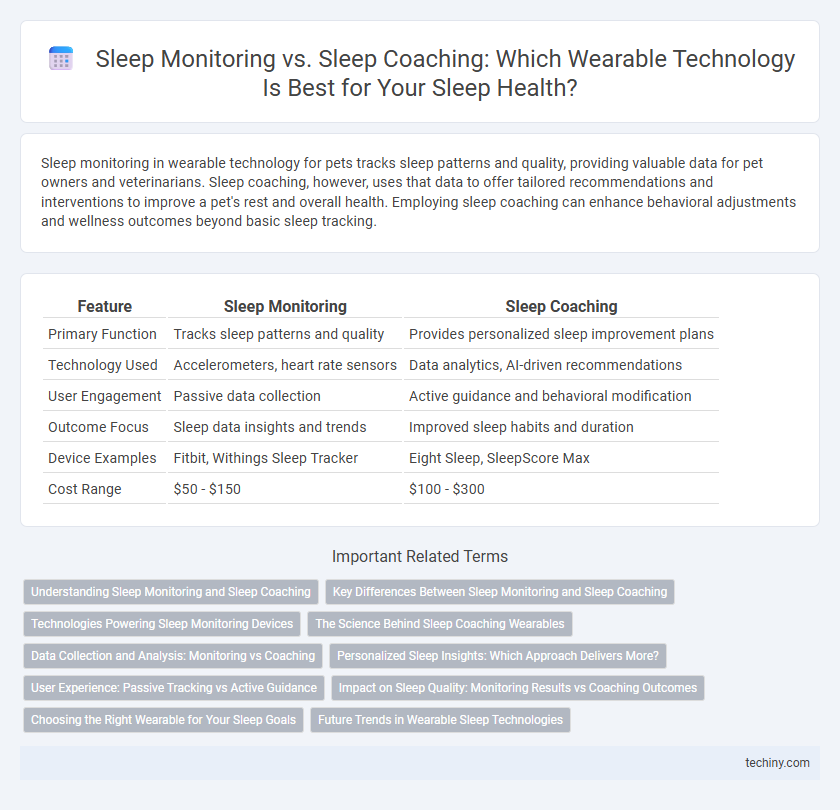Sleep monitoring in wearable technology for pets tracks sleep patterns and quality, providing valuable data for pet owners and veterinarians. Sleep coaching, however, uses that data to offer tailored recommendations and interventions to improve a pet's rest and overall health. Employing sleep coaching can enhance behavioral adjustments and wellness outcomes beyond basic sleep tracking.
Table of Comparison
| Feature | Sleep Monitoring | Sleep Coaching |
|---|---|---|
| Primary Function | Tracks sleep patterns and quality | Provides personalized sleep improvement plans |
| Technology Used | Accelerometers, heart rate sensors | Data analytics, AI-driven recommendations |
| User Engagement | Passive data collection | Active guidance and behavioral modification |
| Outcome Focus | Sleep data insights and trends | Improved sleep habits and duration |
| Device Examples | Fitbit, Withings Sleep Tracker | Eight Sleep, SleepScore Max |
| Cost Range | $50 - $150 | $100 - $300 |
Understanding Sleep Monitoring and Sleep Coaching
Sleep monitoring utilizes wearable technology to track physiological data such as heart rate, movement, and oxygen levels, providing detailed insights into sleep patterns and quality. Sleep coaching interprets this data to offer personalized guidance and behavioral strategies aimed at improving sleep hygiene and overall restfulness. Both approaches leverage sensors and data analytics but differ in application--monitoring emphasizes data collection, while coaching focuses on actionable interventions.
Key Differences Between Sleep Monitoring and Sleep Coaching
Sleep monitoring primarily involves the use of wearable technology to track and analyze sleep patterns, including metrics like sleep duration, REM cycles, and heart rate variability. Sleep coaching goes beyond data collection by providing personalized guidance and behavioral strategies to improve sleep quality based on the monitored data. The key difference lies in sleep monitoring offering insights through automated data, while sleep coaching delivers tailored interventions for long-term sleep health improvement.
Technologies Powering Sleep Monitoring Devices
Sleep monitoring devices use advanced sensors such as accelerometers, photoplethysmography (PPG), and electroencephalography (EEG) to track sleep stages, heart rate, and breathing patterns with high precision. These devices leverage machine learning algorithms to analyze collected data, providing detailed insights into sleep quality and detecting disorders like sleep apnea. Wearable technology integrates real-time data processing and user-friendly mobile apps to deliver personalized sleep recommendations and improve overall sleep health.
The Science Behind Sleep Coaching Wearables
Sleep coaching wearables leverage advanced sensors and machine learning algorithms to analyze sleep patterns in real-time, providing personalized feedback and actionable insights for improving sleep quality. Unlike basic sleep monitoring devices that track duration and stages, these wearables integrate biometric data such as heart rate variability, respiratory rate, and movement to tailor coaching interventions. Research shows that combining physiological data with behavioral recommendations enhances the effectiveness of sleep improvement strategies by addressing individual sleep disorders and lifestyle factors.
Data Collection and Analysis: Monitoring vs Coaching
Sleep monitoring in wearable technology primarily focuses on continuous data collection using sensors to track metrics such as heart rate, movement, and sleep stages, enabling real-time analysis of sleep patterns. Sleep coaching leverages this collected data to provide personalized recommendations and behavioral interventions aimed at improving sleep quality. The distinction lies in monitoring's real-time data aggregation versus coaching's interpretive and actionable insight generation based on data trends.
Personalized Sleep Insights: Which Approach Delivers More?
Personalized sleep insights are more effectively delivered through sleep coaching, which combines wearable technology data with expert analysis to tailor recommendations specific to individual sleep patterns and lifestyle factors. Sleep monitoring devices provide raw data such as sleep stages, duration, and heart rate variability, but lack the interpretative context necessary for meaningful behavior change. Integrating wearable data with customized coaching leads to improved sleep quality and long-term health benefits by addressing unique personal sleep challenges.
User Experience: Passive Tracking vs Active Guidance
Sleep monitoring through wearable technology offers passive tracking by continuously collecting data on sleep patterns, heart rate, and movement without user intervention, enabling seamless integration into daily routines. Sleep coaching, on the other hand, provides active guidance by analyzing sleep data and delivering personalized recommendations, habit adjustments, and behavioral strategies to improve sleep quality. User experience differs significantly as passive tracking demands minimal effort and offers insights, while active guidance requires engagement and proactive involvement for effective sleep optimization.
Impact on Sleep Quality: Monitoring Results vs Coaching Outcomes
Sleep monitoring provides detailed data on sleep patterns, stages, and disturbances, enabling users to identify issues such as insomnia or sleep apnea. Sleep coaching translates this data into personalized strategies, promoting behavioral changes that improve sleep efficiency and overall rest quality. While monitoring offers valuable insights, coaching drives actionable outcomes that enhance long-term sleep health.
Choosing the Right Wearable for Your Sleep Goals
Selecting the right wearable for your sleep goals depends on whether you need detailed sleep monitoring or personalized sleep coaching. Devices with advanced sensors like the Oura Ring and Fitbit Sense provide comprehensive sleep stage tracking, heart rate variability, and respiration rates. For those seeking tailored advice to improve sleep quality, smartwatches equipped with AI-driven coaching features, such as Whoop Strap or Garmin Vivosmart, offer actionable insights based on sleep data patterns.
Future Trends in Wearable Sleep Technologies
Emerging trends in wearable sleep technologies emphasize enhanced sleep monitoring capabilities using advanced sensors and AI-driven data analysis for real-time, personalized insights. Future devices aim to integrate sleep coaching features that offer tailored recommendations and behavioral interventions, improving overall sleep quality through adaptive feedback loops. Innovations in non-invasive biometrics and seamless user experience will drive the convergence of sleep monitoring and coaching into comprehensive digital health ecosystems.
Sleep Monitoring vs Sleep Coaching Infographic

 techiny.com
techiny.com